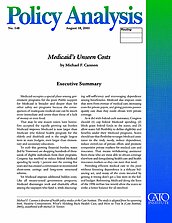Medicaid occupies a special place among government programs for the poor. Public support for Medicaid is broader and deeper than for other safety net programs because the consequences of inadequate medical care can be much more immediate and severe than those of a lack of money or even food.
That may be one reason voters have heretofore accepted the rapidly growing tax burden Medicaid imposes. Medicaid is now larger than Medicare (the federal health program for the elderly and disabled) and is the single largest item in state budgets, even larger than elementary and secondary education.
To curb this growing financial burden, states (led by Tennessee) are dropping hundreds of thousands of eligible individuals from their programs. Congress has resolved to reduce federal Medicaid spending by nearly 1 percent over the coming five years and has created a commission to recommend short-term savings and long-term structural reforms.
Yet Medicaid imposes additional hidden costs. Like all means-tested government programs, Medicaid discourages work and charitable effort among the taxpayers who fund it, while discouraging self-sufficiency and encouraging dependence among beneficiaries. Medicaid also imposes costs that stem from overuse of medical care, increasing costs for private payers, and giving patients poorerquality care than they could obtain with private coverage.
As it did with federal cash assistance, Congress should: (1) cap federal Medicaid spending, (2) block grant federal funds to the states, and (3) allow states full flexibility to define eligibility and benefits under their Medicaid programs. States should use that flexibility to target Medicaid assistance to the truly needy, reduce dependence, reduce crowd-out of private effort, and promote competitive private markets for medical care and insurance. That means withdrawing assistance from those who are most able to obtain coverage elsewhere and deregulating health care and health insurance markets so they can meet that need.
Providing efficient medical care to the poor without fostering dependence is a delicate balancing act, and many of the costs incurred by getting it wrong don’t get a line item in the federal budget. Reforming Medicaid along the lines of the 1996 welfare law would allow the states to strike a better balance for all involved.

This work is licensed under a Creative Commons Attribution-NonCommercial-ShareAlike 4.0 International License.

